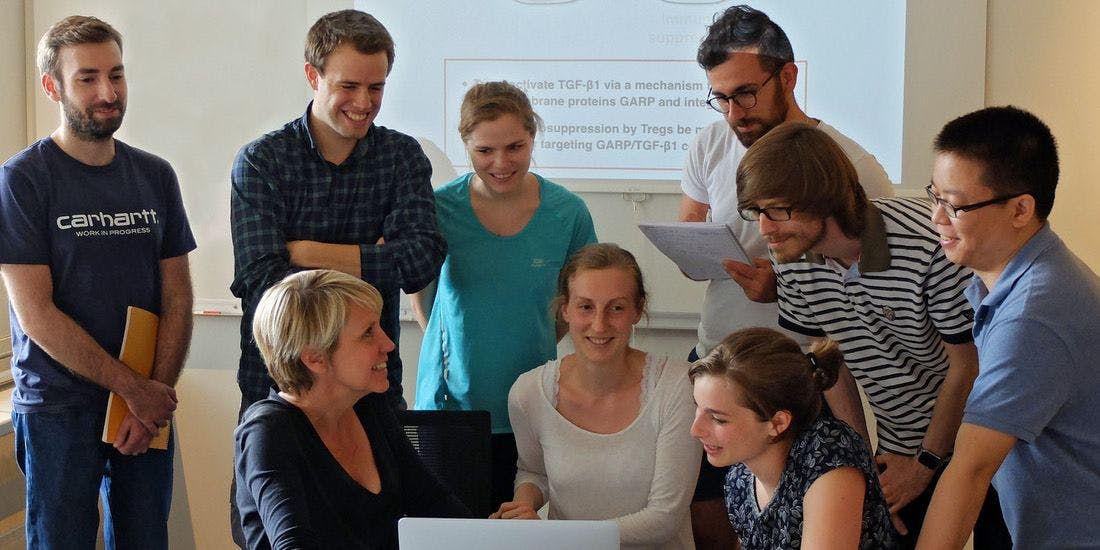
6th de Duve Lecture, by Ivan Đikić
On March 26th, he will enlighten us on the interplay between ubiquitination and autophagy in response to proteotoxic stress.
The GSK Prize from the Academy of Medicine, awarded every 2 years, recognizes work in the fields of vaccinology and immunology that contributes significantly to basic or clinical knowledge and, possibly, has an impact for the patient. For the 2019 edition, Sophie Lucas and her team were rewarded on December 14 for research on tumor immunology carried out in their laboratory over the past 10 years.
Sophie Lucas, a researcher at the de Duve Institute, studies the immune responses that cancer patients can develop against their own tumor. "In the long run, our goal is to try to manipulate these immune responses to make them more effective and enable the patient to reject tumor cells. This would be an incredible breakthrough in the feld of immunotherapy, which is itself an ideal alternative to cancer therapies that target tumor cells, such as chemotherapy or radiation therapy. Immunotherapy, on the contrary, targets the cells of the immune system, in order to stimulate them to turn against the patient's tumor and destroy it.
Sophie Lucas’ major breakthrough? Developing a new drug that is now being tested in cancer patients for targeting their immune system. To achieve this result, the UCLouvain team made major discoveries over the past ten years. The first step: "In 2004, we wondered whether certain cells of the immune system could play a negative role in cancer patients," explains the researcher. The team looked at regulatory T cells (Tregs), which can be very toxic to cancer patients: they regulate the immune system so much that they decrease the efficiency of immune cells (which are supposed to kill cancer cells). As a result, the immune system ceases to be effective at fighting cancer's advance.
The second step: Sophie Lucas' team understood how Tregs managed to decrease the effectiveness of anti-tumor immune cells, which is through the production of an inter-cellular messenger (TGF-beta) that transmits information from Tregs to other cells. This messenger has the ability to inhibit anti-tumor immune cells, thereby reducing their effectiveness. In 2009, the team realized that the Tregs needed another molecule to produce these messengers. A sort of accomplice, called GARP. Thus, in just a few years, Sophie Lucas’ team identified Tregs, TGF-beta and GARP as three major players that decrease anti-tumor immune responses.
After tests in mice, the UCLouvain team observed that the administration of an anti-GARP monoclonal antibody could cure cancer in mice. "The results of these tests aren't published yet," says Sophie Lucas. "However, it seems that this drug works in mice. The administration of this antibody succeeds in inducing the rejection of certain tumors." This promising discovery attracted a pharmaceutical company's interest. "Human clinical trials have just started. A few cancer patients have just been injected with our anti-GARP monoclonal antibodies," said Sophie Lucas.
What's next? If clinical trials yield encouraging results, the team will have access to biopsies taken from patients treated with the new drug. "That’ll be the moment to confirm whether it works and try to foresee combining it with other anti-tumor drugs to improve effectiveness." In addition, the team will continue to work on the fundamental aspects of the biology of TGF-beta and GARP. "We know that cells other than Tregs produce these "messengers" via GARP, but we don't know what for." Is it to systematically decrease the immune responses? Or do these actors play other roles? "To better understand the biology of this set of amazing molecules, we will expand our area of expertise, which is currently focused primarily on cancer, to chronic infections or autoimmune diseases, for example," adds Sophie Lucas. When could an effective drug appear? "It will take another 3 to 5 years to see if our drug shows signs of efficacy without excessive toxicity for cancer patients," says Sophie Lucas.
More details about this research in ScienceToday

In the press
MyScience.be - Immunotherapy: a promising alternative - 14/12/2019
News-Medical.net - Immunotherapy: A promising new alternative to cancer therapies - 16/12/2019
BrusselsTimes.com - Belgian researcher aims to turn body’s own defences against cancer - 29/12/2019
EnglishForums.com - Cancer treatment using ‘Tregs’ being developed by Belgian researcher - 30/12/2019
FocusOnBelgium.be - An antibody to kill tumours - 6/01/2020
LN24.be - L'immunothérapie: futur de la lutte contre le cancer ? (video) - 23/12/2019
La 1ère - participation à l'émission "Les Eclaireurs" (audio) - 25/01/2020
LeSoir.be - La professeure Sophie Lucas récompensée pour son «tueur de tumeurs» - 15/12/2019
LeVif.be - Une professeure de l’UCLouvain récompensée pour sa recherche sur le traitement du cancer - 16/12/2019
MyScience.be - L’immunothérapie, une alternative prometteuse - 14/12/2019
DailyScience.brussels - Les travaux de Sophie Lucas (Institut de Duve) sur l’immunothérapie du cancer récompensés par le prix GSK - 16/12/2019
L'echo.be - Sophie Lucas, combattre le cancer par immunothérapie - 17/12/2019
DHnet.be - Primée, une chercheuse belge met au point un traitement très prometteur contre le cancer - 28/12/2019
FocusOnBelgium.be - Un anticorps pour tuer les tumeurs - 6/01/2020
DailyScience.brussels - Nieuw kankermedicijn moet eigen afweer sterker maken - 16/12/2019
FocusOnBelgium.be - Antilichaam om kankercellen te doden - 6/01/2020
Also on L'avenir.net, PharmaJobs.co, EurekAlert! & StemCellTherapy.tv